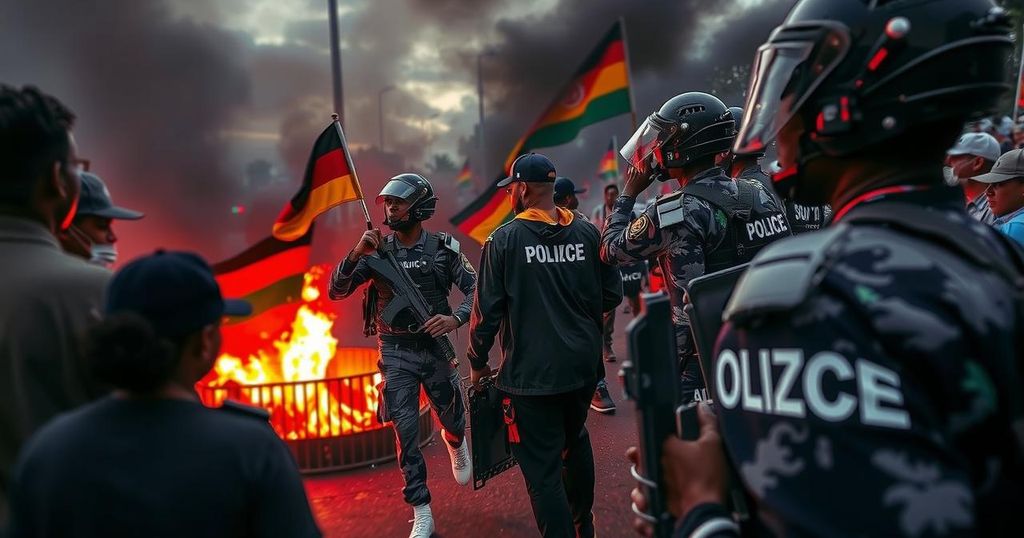Escalating Unrest in Mozambique: Protests Erupt Following Controversial Elections
Following the Oct. 9 elections in Mozambique, widespread protests erupted against the ruling Frelimo party, which extended its 49-year rule amid allegations of electoral fraud. The government’s violent crackdown on demonstrators has resulted in tragic casualties, prompting significant unrest and a tense political atmosphere, compounded by a history of civil war and ongoing regional violence.
Protests in Mozambique have erupted following the Oct. 9, 2024 elections, which resulted in the ruling Frelimo party extending its 49-year hold on power. Many citizens and opposition parties have deemed the elections fraudulent, alleging various voting irregularities such as ballot stuffing and manipulation of voter lists. The unrest has been met with a violent crackdown by police, resulting in a tragic death toll that international rights organizations estimate to be over 20, while local reports suggest more than 50 casualties. The situation in the capital, Maputo, has escalated into significant confrontations as demonstrators have clashed with law enforcement, resulting in the deployment of tear gas and rubber bullets. Furthermore, authorities have restricted internet access and closed borders with neighboring South Africa amidst ongoing violence and civil disorder. The elections held on October 9 were meant to solidify Frelimo’s leadership, with candidate Daniel Chapo announced as the victor on October 24. Opposition groups, however, quickly accused the ruling party of electoral fraud, which was echoed by the European Union’s observation team citing irregularities. The discord intensified following the assassination of two senior opposition figures shortly after the elections, leading to increased protests across the nation. The opposition’s presidential hopeful, Venancio Mondlane, has called for a national strike, condemning the actions of the ruling party and urging citizens to resist the government’s long-standing oppression. Mozambique’s political climate is particularly volatile, rooted in a history of civil conflict and recent insurgencies in the northern provinces. The economic landscape remains troubled by an ongoing insurgency linked to extremist groups, which adds to public discontent. Despite Frelimo’s claims of stability and governance, widespread frustrations among the populace signal a significant challenge to its longstanding rule, especially from the youth who are increasingly rallying behind opposition candidates. As protests continue to swell, authorities have maintained a firm stance, insisting on suppressing the violence, which further complicates efforts for dialogue and resolution. This unrest highlights the fragile state of Mozambique’s democracy, where years of governance by a single party have fostered popular resentment and calls for change. The current political crisis raises urgent questions regarding the protection of human rights and the democratic processes in the nation, showcasing an emerging landscape of activism and dissent.
Mozambique has been under the governance of the Frelimo party since gaining independence from Portugal in 1975. This recent election, which results in the continuation of Frelimo’s authority, has provoked widespread allegations of electoral malpractice, raising alarms about the integrity of the democratic process in the country. The protests began after opposition parties rejected the election results, citing extensive fraud and manipulation, which resulted in violent clashes between demonstrators and police forces. The situation is compounded by Mozambique’s history of civil conflict and its ongoing struggles with insurgency, creating a potent mix of political dissatisfaction and civil unrest.
In summary, the ongoing protests in Mozambique underscore a significant challenge to the Frelimo party’s prolonged rule, reflecting widespread discontent with alleged election fraud and the government’s authoritarian response. The alarming escalation of violence, significant casualties, and a clampdown on civil liberties suggest a critical moment in Mozambique’s political landscape. The international community and human rights organizations must remain vigilant and advocate for the restoration of democratic principles and the protection of the Mozambican people’s rights as they seek to resolve this unrest and foster a path forward.
Original Source: apnews.com




Post Comment